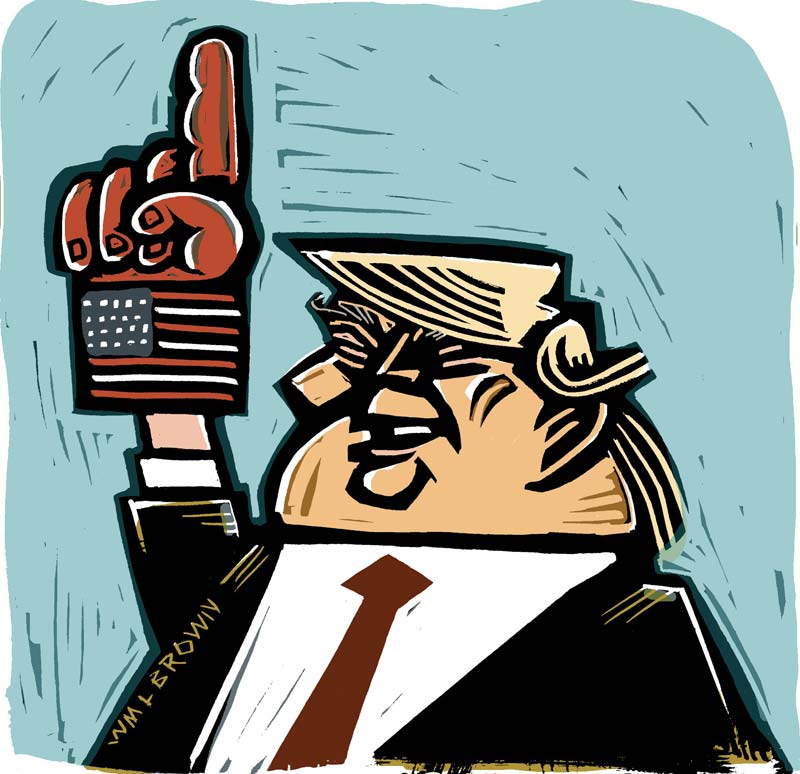
That should be obvious to everyone by now, but his critics and even some of his supporters immediately acted as if it were 2003 on the cusp of the Iraq War when Trump ordered an airstrike to take out Iranian commander Qassem Soleimani.
Suddenly, the neocons had cachet again (Vox warned that "the Iraq War hawks are back"), and we were about to launch yet another endless war. Trump's decision to kill Soleimani, New York Times columnist Michelle Goldberg wrote, repeating a common refrain, "has brought the United States to the brink of a devastating new conflict in the Middle East."
There's no doubt that the operation against Soleimani carried risks — and still does — but it didn't transform Trump into a conventional interventionist. In fact, taking out Soleimani was wholly consistent with the president's approach to the world that can't be plotted on a simple hawk/dove or neocon/isolationist axis. As a Jacksonian, Trump is none of those, combining a willingness to whack our enemies with a distaste for ambitious foreign interventions.
The Jacksonian label is the famous construction of foreign policy analyst Walter Russell Mead, who traces the tradition to Andrew Jackson and the cultural influence of the American backwoods. Jacksonians are content to let the world sort itself out, except if they perceive a threat, in which case they react with great ferocity.
As Colin Dueck of the American Enterprise Institute writes in his book "Age of Iron," what Trump did in 2016 was to "unite the GOP's hard-line unilateralists with many of its noninterventionists in a full-blown and politically successful assault on the party's dominant internationalist faction." This overturned the reigning Republican foreign policy consensus, but it didn't herald a lurch to isolationism pure and simple.
Even when Trump sounded most hostile to U.S. commitments and alliances abroad in 2016, he promised, in one of his most Jacksonian sentiments, to "bomb the shit" out of ISIS. No matter how much Trump disdained being in the Middle East, it wouldn't be possible to follow through on that threat without military assets, an intelligence network and allies on the ground. Once elected, Trump did, sure enough, bomb the shit out of ISIS.
Killing Soleimani is keeping with this general orientation rather than a departure from it. In fact, the whole thing is shot through with Jacksonian attitudes.
Trump's red line to Iran didn't have to do with our values, or shipping lanes, or any humanitarian impulse. It reflected the most basic imperative of a nation protecting its own: Don't harm Americans.
When a rocket attack by an Iranian-supported militia killed an American contractor and injured other Americans at a base in Iraq, Trump's response was also characteristically Jacksonian: a stunning, bolt-out-of-the-blue droning of an enemy commander who was thought to be safely out of bounds, designed to create the maximum deterrent bang for the buck.
If this was incredibly bold, it was also quite limited. After the Iranians retaliated in a deliberately circumscribed fashion, Trump seemed happy to pocket what he achieved and gave a White House speech reverting to his policy of seeking a better Iran deal through pressure on the regime.
Trump's outlandish (and completely counterproductive) statements in the aftermath bore a Jacksonian stamp, too. His insistence that we should be able to hit Iranian cultural sites if Tehran kills our people was typical of the no-holds-barred attitude. And his threat to make Iraq pay us back if they forced us out of the country reflected a blustery focus on what's in it for us.
All of this is why the complaint from Trump's populist backers that the president has been co-opted by deep-state warmongers, putting at risk his political base, is misplaced. Trump never promised anyone he'd refuse to respond to threats to Americans, or honor the unspoken rules protecting a blood-stained high official of a hostile foreign regime. In fact, if Trump had said any of those things, it would have been out of character.
Bellicosity of a certain kind — taunting and over-the-top, boasting of our awesome military capabilities, and motivated by considerations of personal and national honor — is key to the Trump brand.
The killing of Soleimani is more likely to add to the legend of Donald Trump among his most loyal backers instead of giving them pause. In their view, here is President Trump once again doing what no other president would do, taking an inordinate amount of criticism for it, often from a perpetually hysterical press corps, and having it work out (so far).
Whether Trump can stick a landing on his broader Iran policy remains to be seen. The Jacksonian impulse alone is not enough to solve such a complex foreign policy problem. But it can be useful in a contest of intimidation and escalation with a foreign adversary. The killing of Soleimani isn't a deep-state or neocon project, rather an unmistakable expression of Trump's distinctive worldview.


 Contact The Editor
Contact The Editor
 Articles By This Author
Articles By This Author